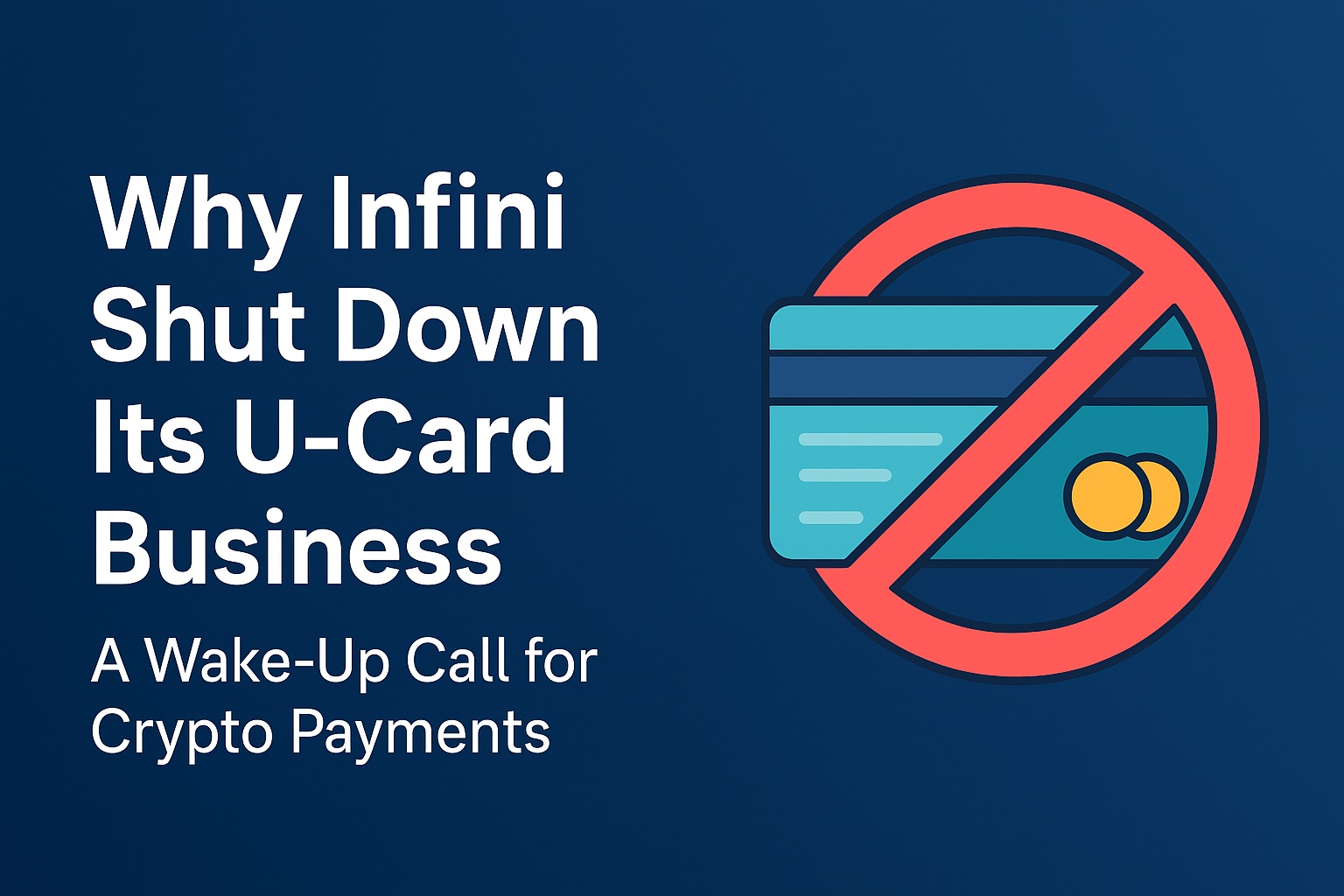Infini Shuts Down U-Card Service — A Strategic Pivot Toward Sustainable Crypto Finance
On June 17, crypto startup Infini officially shut down its U-Card service, a prepaid card that allowed users to spend stablecoins like USDT on real-world purchases. The announcement sparked widespread concern among users who relied on the service for subscriptions and international payments.
“How will I renew my ChatGPT and Twitter Blue subscriptions?”
“Will the card service return someday?”
These were just a few of the questions flooding crypto Twitter in response. The shutdown wasn’t taken lightly — but for Infini, it was a rational and necessary strategic retreat.
Why Did Infini Shut Down Its U-Card?
In a follow-up post on X, co-founder Christine explained that high compliance costs, razor-thin margins, and operational burdens made the U-Card business unsustainable. While the decision was painful, Infini will now shift its focus toward wealth management and decentralized payment solutions, firmly turning away from centralized card infrastructure.
Despite building a loyal user base across the Chinese-speaking crypto community, Christine emphasized that continuing the card business simply wasn’t aligned with long-term growth or profitability. The team took their time, debated thoroughly, and ultimately made the call after serious internal discussions.
Importantly, Infini rolled out a well-handled user exit plan:
- Automatic refunds of activation fees
- Safe clearance of pending balances
- A 21-working-day timeline to complete all refunds
This responsible wind-down reflected not only business ethics but also Infini’s commitment to user trust — a rare show of integrity in the crypto world.
The Harsh Reality of the U-Card Business
Christine outlined two main reasons behind the shutdown, each reflecting deeper industry issues:
1. Escalating Costs at Every Layer
Infini operated at a loss. From compliance to infrastructure, costs ballooned at every stage:
- KYT (Know Your Transaction) and KYC (Know Your Customer) checks were required on every user and transaction — using services like Cobo and Sumsub — with fixed fees whether approved or denied.
- Card network fees (e.g., Visa/Mastercard) included flat monthly costs, FX conversion charges (1–1.5%), and API licensing fees.
- Infini chose to cover many of these fees themselves rather than pass them to users — a user-first strategy that proved financially unsustainable.
- Regulatory licenses were the most expensive of all — obtaining an MSO in Hong Kong or EMI in Europe involved ongoing costs and legal overhead.
2. A Broken Business Model
To make U-Cards profitable, companies often raise fees — but Infini refused to compromise on affordability. The reality? Many users already had ways to convert stablecoins into fiat locally. U-Cards didn’t offer enough added value to justify their cost.
Moreover, the user experience didn’t match Web2 expectations. Complaints about foreign transaction fees — even though charged by card networks, not Infini — damaged perception. The service became a high-cost, low-reward burden for a startup without a large trading business to offset the losses.
How Centralized Players Stay Afloat
Companies like Coinbase and Bybit continue to push card products, but Christine points out they do so as retention tools, not profit engines. With built-in infrastructure, compliance teams, and deeper user engagement, exchanges can afford to offer U-Cards as perks to encourage users to keep funds on-platform — something Infini simply couldn’t replicate.
The Bigger Picture: U-Cards Are Not the Future
Despite the original promise — bridging crypto and real-world spending — U-Cards are now seen by Christine as a regressive workaround. True crypto payments should not rely on fiat systems.
“We don’t want to go back to legacy rails. We want to enable pay with crypto, pay with stablecoins.”
Infini believes in direct stablecoin payments, offering near-instant finality and ultra-low fees. In her view, the future of crypto payments lies not in adapting to traditional banking infrastructure, but in building native decentralized solutions.
What’s Next for Infini?
Christine shared that Infini is pivoting in two directions:
- Wealth Management – The team will launch diverse, risk-adjusted DeFi and CeFi yield products to offer sustainable returns to users regardless of market cycles.
- Decentralized Payments – Infini is developing a native crypto payment system that removes reliance on fiat settlement entirely.
The startup aims to provide:
- Flexible products for both long-term holders and yield-seekers
- Transparent risk levels and liquidity options
- Infrastructure that supports stablecoin spending without converting to fiat
Lessons from the Shutdown
Christine reflected on her early underestimation of compliance complexity. She now acknowledges the unique difficulty of running a payments startup in crypto — far beyond building on-chain products.
Still, Infini walked away with three core takeaways:
- The value of a resilient and mission-aligned team
- The irreplaceable importance of reputation in the crypto world
- A renewed commitment to building decentralized-native financial tools
Even after a painful pivot, Infini remains bullish on crypto payments. But this time, they’re building for the long game.

![[News] Bitcoin at a Turning Point? 10x Research Signals a Bullish Macro Shift Ahead](https://cryptoexplores.com/wp-content/uploads/2025/06/new20250616.jpg)
![[News] Binance Lists $HOME, the Gas-Free, Bridge-Free All-in-One DeFi App](https://cryptoexplores.com/wp-content/uploads/2025/06/news20250617.jpg)